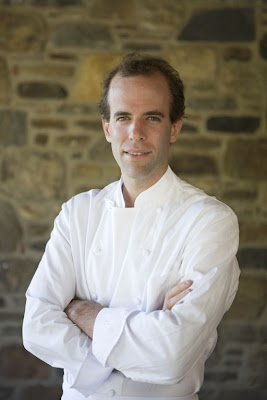 http://www.ted.com/speakers/dan_barber.html
http://www.ted.com/speakers/dan_barber.html How many times I’ve heard this: the way to a man's heart is through his stomach (I was actually very much surprised that this piece of wisdom in English is worded absolutely identical to Russian). However, it is equally true for women: how nice it is to see a man in the kitchen! Somehow, all of my memorable relationships started with my man cooking for me. So, Dan Barber, a cooking guy, is certainly my hero. And if we are what we eat, I choose to book a table at a chef-thinker’s eating house.
This is what TED.com says about him: "Dan Barber is the chef at New York's Blue Hill restaurant, where he practices a close-to-the-land cooking married to agriculture and stewardship of the earth. As described on Chez Pim: "… it might… be a whole different universe. A model of self-sufficiency and environmental responsibility, Stone Barns is a working farm, ranch, and a three-Michelin-star-worthy restaurant." Supported by the Rockefeller Foundation, it's a vision of a new kind of food chain. Barber's philosophy of food focuses on pleasure and thoughtful conservation: on knowing where the food on your plate comes from and the unseen forces that drive what we eat."
On the TED show, chef Dan Barber tells the story of a small farm in Spain that has found a humane way to produce foie gras.
What??? Foie gras??? Quel horreur!!! ...
Paradoxes and duplicities of our societies, such as foie gras controversy, strike me with their naivety. Or hypocrisy? Restaurants and businesses serving foie gras are under attack and yet at the same time there is no problem with serving chicken. As an anthropologist Steve Striffler wrote in his book “Chicken: The Dangerous Transformation of America's Favorite Food”: “I used to eat chicken without much thought about where it came from, or how and by whom it was raised and processed. Life was much easier then.” He reports on the way chickens are raised today. What he discovered about America’s favorite meat is not just unpleasant but is a powerful indictment of the whole industrial food system. The process of bringing chicken to our dinner tables is unhealthy for all concerned—from chicken to farmer to factory worker to consumer. Groups of foie gras protesters picketing restaurants serving foie gras have no problem with McDonald's, or other big chains that serve things that are raised in equally questionable circumstances.
As for myself, I successfully survived without foie gras in North America for so many years, even if I still remember the silky aftertaste of the real foie gras we degustated (this is an appropriate verb for foie gras) in Toulouse, served by my friends' local éleveur-producteur (and yes - bright yellow!). Not only this: I stopped eating beef long ago, I eat pork more and more rarely and ready to stop completely, chicken - idem, and I think the lobster I cooked for the last New Year’s Eve was the last, no matter how ethically it might have been grown. Yes, but what if tomorrow someone will describe and scientifically prove that plants suffer, too???



I agree with your thoughts completely. It makes no sense how restaurants are being punished for the way they treat the geese, whereas the chickens, the pigs, and the cows are experiencing much worse. For many of those animals who are grown for food, they life is like a horror movie from day one. Many of the calves drink the milk with blood of the dead cows on that farm. It is just ridiculous! And not to mention the fact that most animals are fed corn. Corn creates a stonger E.coli bacteria in the guts of the cows, and that e.coli, when exists the cow in the form of manure, then enters our soils, our lakes/rivers, and then our food. When it this horror going to end? When are we going to learn from the whole foie gras incident and give the same treatment we show geese to all of the other farm animals. In order to get anything to be done with our food,we, being the consumers, need to change our eating and shopping styles. By you adopting a more vegetarian life style, you are demonstrating to companies that you do not want meat, but want more vegetables, and they will produce more vegetables than meat. Change with the way our food is treated before it comes to out table must start with the consumer.
ReplyDeleteVery mature opinion stimulating me, maturing vegetarian. Thanks!
ReplyDeleteI believe in wisdom of humanity and wisdom of human body. I believe all of us should have choices how to eat and what to eat.
ReplyDeleteWe live in the North Country and during the winter a lot of human bodies required the meet. 6 billion people are in this earth. How to feed them without cruel technology?
How some one can attack chef who create foie gras and not attack fast food productions?
I am just asking questions, I am not defending or accusing anyone.
Plus I love foie gras, caviar and other delicacy. It is not every day food, but some time I like to enjoy art of cooking.
Interesting thing: I noticed that for the last couples of months the most "artistic" culinary things I produce when cook with veggies: vegetarian lasagna, moussaka with lentils instead of meat, tortilla espagnola, cabbage rolls with buckwheat instead of meat, all kinds of soups... I think my internal chemistry changed under the influence of my thoughts, and all I'm thinking now is all about ecology, sustainability, "going green", ethical, etc. And what are you cooking today?
ReplyDeleteChinese stir fry with lamb and a lot of greens!
ReplyDeleteVery inspiring, OK, I'm going to the kitchen...
ReplyDelete